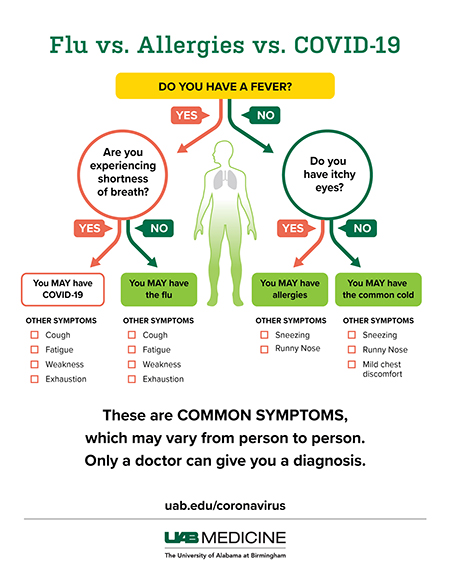Editor's Note: The information published in this story is accurate at the time of publication. Always refer to uab.edu/uabunited for UAB's current guidelines and recommendations relating to COVID-19.
 As the COVID-19 pandemic grows, many health care systems across the country are beginning to become overrun with patients experiencing symptoms that are common to many illnesses. To alleviate the pressure on health care workers, here is a guide from the University of Alabama at Birmingham to help you determine whether you have a cold, the flu or allergies or are indeed infected with COVID-19.
As the COVID-19 pandemic grows, many health care systems across the country are beginning to become overrun with patients experiencing symptoms that are common to many illnesses. To alleviate the pressure on health care workers, here is a guide from the University of Alabama at Birmingham to help you determine whether you have a cold, the flu or allergies or are indeed infected with COVID-19.
COVID-19
Primary symptoms of COVID-19 include:
- Fever
- Runny nose
- Dry cough
- Shortness of breath
- Fatigue
- Body aches
Severe symptoms include:
- Fever (100.4 degrees Fahrenheit or higher)
- Pneumonia
Transmission:
COVID-19 is believed to spread from person to person through sneezing or coughing. Respiratory droplets containing the virus can remain on surfaces even after the ill person is no longer near.
"It's important for us to distinguish the difference between COVID-19 and influenza," said William Curry, M.D., associate dean UAB primary care and rural medicine. "This will become apparent with shortness of breath."
“It’s important for us to distinguish the difference between COVID-19 and influenza,” said William Curry, M.D., associate dean UAB primary care and rural medicine. “This will become apparent with shortness of breath.”
|
If you are experiencing symptoms, call your primary care physician or urgent care facility first. |
Influenza (Flu)
Influenza (flu) can cause mild to severe illness, and at times can lead to death. Flu is different from a cold. Flu usually comes on suddenly. People who have the flu often feel some or all of these symptoms:
- Fever or feeling feverish/chills
- Cough
- Sore throat
- Runny or stuffy nose
- Muscle or body aches
- Headaches
- Fatigue
- Some people may have vomiting and diarrhea, though this is more common in children than adults.
It is important to note that not everyone with the flu will have a fever. Symptoms typically last one week.
Common cold
| Get the latest COVID-19 information at uab.edu/coronavirus. |
While both colds and the flu are caused by viruses and typically lead to a stuffy nose, coughing and a sore throat, knowing the difference between cold and flu symptoms, many of which overlap, can make a world of difference when it comes to figuring out the type of infection you may have.
A cold happens gradually and is felt mainly in the head and the nose, usually with more mild symptoms and fatigue. While you may feel crummy, if you do not have a fever, you can still generally continue to go about your day.
However, if you have the flu, symptoms are much more severe than with a cold and have a quick onset.
Allergies
Allergies are often confused with the flu, but there are a few important distinctions to make. Typical allergy symptoms are:
- Sneezing
- Congestion
- Runny or stuffy nose
- No fever
Every season brings with it different allergens, and the most common triggers for spring and fall allergies include pollen from weeds, trees, grasses and mold spores.
 Be vigilant
Be vigilant
“Knowing the difference in symptoms can help you determine the best route for treatment,” said Molly Fleece, M.D., assistant professor of infectious diseases. “Depending on the type of infection, a physician may be able to prescribe an antiviral drug to help speed up the recovery process by shortening the amount of time that a person is sick and preventing the serious complications that can come with the flu.”
Fleece says many health care providers are utilizing telemedicine and eMedicine during the coronavirus epidemic to provide patients with appropriate therapies while avoiding unnecessary in-person contact. She says patients should call their medical provider before going to a clinic, doctor’s office or emergency department and should follow their instructions. Do not go to a medical facility without calling first. If you have COVID-19, you run the risk of infecting others and continuing the spread of the disease. If you do not have it, you run the risk of becoming infected yourself.
For more updates on COVID-19, visit uab.edu/coronavirus.